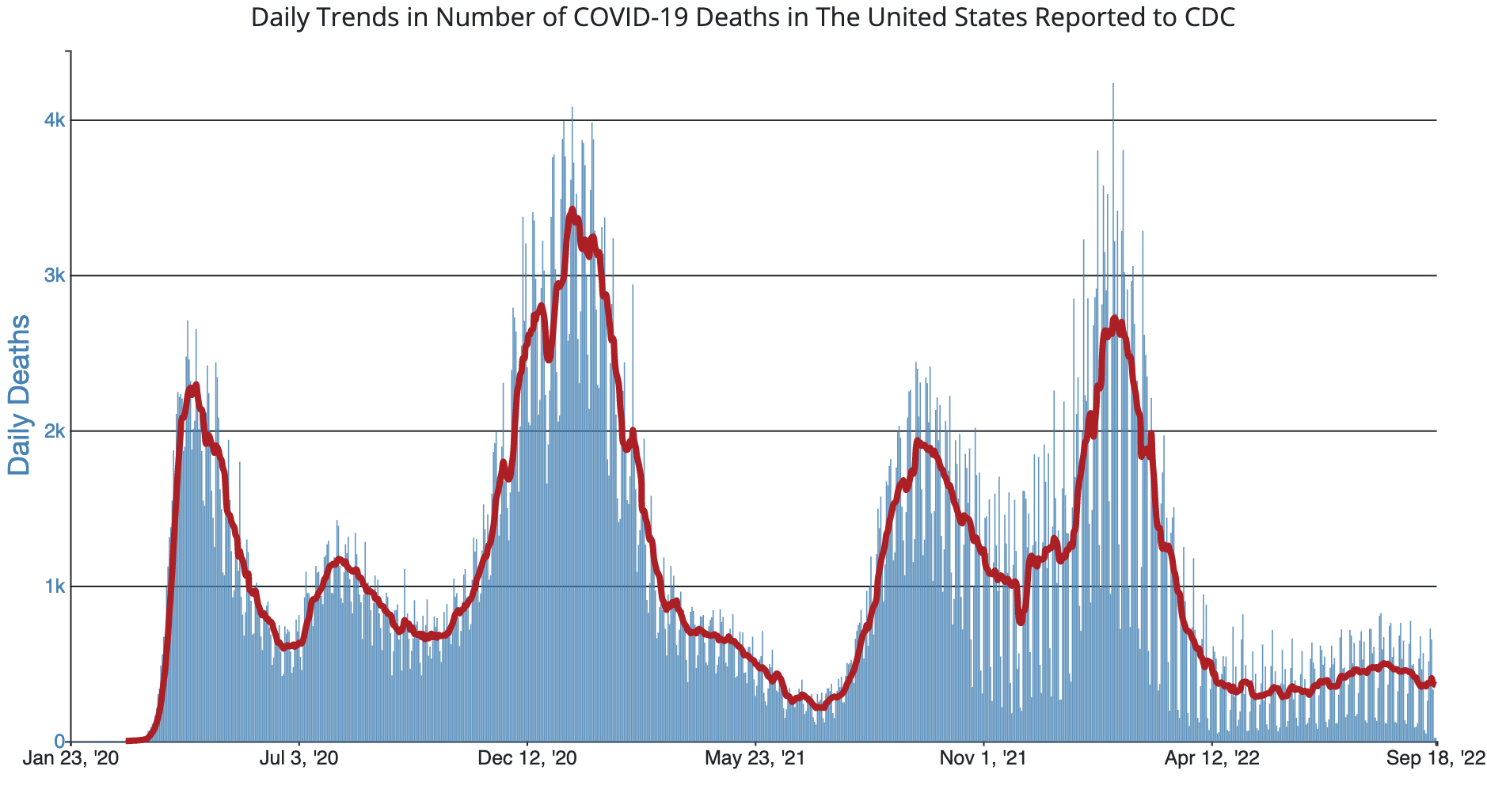Is the Pandemic ‘Over’? Biden Says So, But Scientists Say That’s Up for Debate
In a surprise moment in a “60 Minutes” interview, President Joe Biden said the COVID-19 pandemic “is over.” While he correctly acknowledged that the coronavirus was still a problem, epidemiologists say there’s no single agreed-upon definition for what constitutes the end of a pandemic — and some say we’re not there yet.
In the U.S., around 400 people a day have died of COVID-19 during the first half of September, according to statistics reported to the Centers for Disease Control and Prevention.
Biden made his remarks at the Detroit Auto Show in response to CBS’ Scott Pelley, who asked whether the pandemic was over after noting it was the first time in three years the auto show was being held.
“The pandemic is over,” Biden said in the interview, which aired on Sept. 18. “We still have a problem with COVID, we’re still doing a lot of work on it, but the pandemic is over.”
 “If you notice, no one’s wearing masks, everybody seems to be in pretty good shape,” Biden continued, as the two walked through the convention center. “And so I think it’s changing. And I think this is a perfect example of it.”
“If you notice, no one’s wearing masks, everybody seems to be in pretty good shape,” Biden continued, as the two walked through the convention center. “And so I think it’s changing. And I think this is a perfect example of it.”
Epidemiologists agree that the pandemic is no longer as dire as it once was, given access to life-saving vaccines, improved treatments and a population that in large measure has already been infected at least once. But the death toll, while lower than before, is still relatively high — and it’s unclear what the future may bring.
Biden had not planned to make such a declaration, according to reporting from the Washington Post and Politico. As recently as last month, when the Centers for Disease Control and Prevention announced more relaxed COVID-19 guidelines, the agency specifically said that the pandemic was not over.
The head of the World Health Organization, too, had said the same just days before.
“We have never been in a better position to end the pandemic. We are not there yet but the end is in sight,” WHO’s director-general, Dr. Tedros Adhanom Ghebreyesus, said in a press conference on Sept. 14.
The day after Biden’s interview aired, Health and Human Services Secretary Xavier Becerra insisted that the president was right to say the pandemic was over.
“The president is right,” Becerra told Yahoo Finance, saying that Biden “was reflecting what so many Americans are thinking and feeling.” He added that vaccines, tests and treatments had changed the game, but that the president had been clear Americans were still dying from COVID-19 and the virus was still with us.
On one level, the pandemic is very much still ongoing: While not the same as a “pandemic,” the World Health Organization continues to consider COVID-19 a public health emergency of international concern, and the U.S. also classifies it as a public health emergency.
The White House did not respond to our request for comment. But officials have said Biden’s statement does not mark a change in national COVID-19 policy, and the administration did not plan to rescind the public health emergency. The emergency declaration is slated to expire on Oct. 13 unless it is renewed (as it has been nine times since January 2020), although HHS has said it will provide 60 days notice before it ends.
While determining the “end” of a pandemic might seem like a simple prospect, epidemiologists say it’s not so straightforward.
“There’s not a standard definition out there,” Bill Hanage, an associate professor of epidemiology at Harvard’s T.H. Chan School of Public Health, told us in an email. “Previous pandemics have ‘ended’ when people no longer count the fluctuations in cases as large enough to merit calling it such. But for instance, after the three waves usually thought to make up the flu pandemic that started in 1918-19, there continued to be sustained surges of disease.”
One way to define the end, Hanage said, might be when there is no longer excess mortality. But that can get complicated, he said, because mortality shifts, such as when people who would have normally been expected to be dying now died last year. Mortality can also be affected by the quality of health care, and might be higher than expected if the pandemic has harmed the health care system.
Jennifer Nuzzo, an epidemiologist and director of the Pandemic Center at Brown University School of Public Health, has said that for her, the pandemic will end when COVID-19 no longer has the “ability to disrupt our lives.”
“I’m not sure that there’s any meaningful definition of ‘pandemic’ that would provide a clear timing of when the COVID-19 pandemic would be ‘over,’” David Dowdy, an epidemiologist at Johns Hopkins Bloomberg School of Public Health, told us in an email, adding that he did not think there was a consensus on the question, since there was no consensus on a definition.
Still, he said that he thought it was premature to say the pandemic has concluded.
“I think it’s important to acknowledge that we are in a new phase of COVID-19, where hospitalizations and deaths have been consistently low for five months. But there is still some uncertainty about what will happen over the coming winter, and all-cause mortality is still well above pre-pandemic levels. The number of people dying of COVID-19 in the US is similar to the number who die of flu in the midst of flu season – but this is happening in the middle of September,” he said. “So while I think it’s important to signal to people that we really have been in a different phase of COVID-19 since about April, I’m not sure that anything has happened in the past month or two that would lead to us thinking that the pandemic is now over. If it were me, I’d like to wait until we get through the winter before making that call.”

Multiple experts noted to the press that they did not consider the pandemic over, with some going so far as to say Biden was wrong. But some also thought conditions had changed enough to agree with the president.
“We have a new disease, a new health risk. That’s COVID. It’s unpredictable. It’s killing people. And yes, we need to do much more to control it and much more to care for people,” Dr. Thomas Frieden, a former director of the CDC, told NPR. “But the pandemic as a phenomenon that ruled our lives for two years — that’s past.”
It’s worth noting that legally, there’s also no real answer about when a pandemic ends.
“There’s no formal process under international law or governance for declaring a pandemic over,” Alexandra Phelan, a public health and international law expert at Georgetown University, explained on Twitter. “For influenza, the post-pandemic phase is defined by a return to seasonal levels,” she continued, citing the WHO’s guidance document on pandemic flu, “but we don’t know (1) if that will occur for COVID19 (albeit likely) & (2) what those levels will be.”
But in applying that guidance to COVID-19, it seemed transparent to Phelan that the world was in a “post peak” — not “post pandemic” — phase. “With the continued transmission of COVID19 and emergence of new variants, we are clearly not in the ‘pandemic’s over’ phase,” she wrote.
The WHO does not officially declare the end of a pandemic, Phelan told STAT, but the organization will at some point decide to end the public health emergency of international concern for COVID-19. That will change reporting rules for outbreaks and various pandemic-related programs, and have financial ramifications as drug makers no longer allow their treatments to be made as generics for primarily low- and middle-income countries. Harvard epidemiologist Caroline Buckee told Science that the decision to end the PHEIC will not be based on just a scientific threshold, but rather an “opinion-based consensus” incorporating social and political factors as well.
As we’ve written before, scientists have long known that the coronavirus, or SARS-CoV-2, will not go away entirely — and will remain an ongoing concern for a long time. And that’s true regardless of whether people choose to call it a pandemic.
“We can debate when the pandemic phase is over, but we know that COVID-19 is not over,” Dowdy said.
The coronavirus, Hanage said, “has never been going away, and people will inevitably continue to die albeit in diminishing numbers.” Rather than dwelling on the semantics, he said, the “question should actually be what sort of numbers do we find acceptable, and how can we work to reduce them further?”
Editor’s note: SciCheck’s COVID-19/Vaccination Project is made possible by a grant from the Robert Wood Johnson Foundation. The foundation has no control over FactCheck.org’s editorial decisions, and the views expressed in our articles do not necessarily reflect the views of the foundation. The goal of the project is to increase exposure to accurate information about COVID-19 and vaccines, while decreasing the impact of misinformation.
This article has been archived for your research. The original version from FactCheck.org can be found here.


